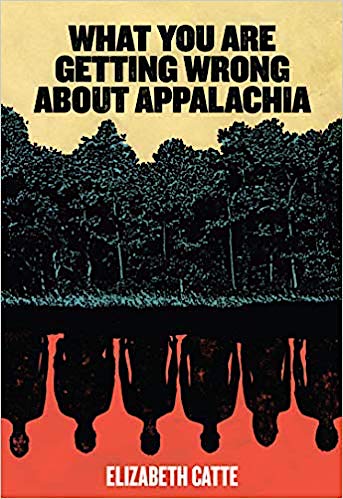A rebuttal book to Hillbilly Elegy
 The Appalachian region, defined by the Appalachian Regional Commission, includes 420 counties in 13 states in the United States. All of West Virginia, parts of Kentucky, and parts of Ohio are considered Appalachian.
The Appalachian region, defined by the Appalachian Regional Commission, includes 420 counties in 13 states in the United States. All of West Virginia, parts of Kentucky, and parts of Ohio are considered Appalachian.
The story of an Appalachian family was told by J.D. Vance in his 2017 book, Hillbilly Elegy: A Memoir Of A Family And Culture In Crisis. It will soon become a Ron Howard Hollywood movie.
Many rural readers took offense to Vance’s stereotypical representation. As did Elizabeth Catte—so much that she responded with her own book, What You Are Getting Wrong About Appalachia (Belt Publishing, 2018, 132 pages).
Elizabeth Catte is a writer and historian from East Tennessee. She holds a Ph.D. in public history from Middle Tennessee State University. She is the co-owner of Passel, a historical consulting and development company. www.elizabethcatte.com.
Catte digs into the “Trump Country” hyperbole in her book. The “Trump Country” slogan denies the reality that Bernie Sanders also won large parts of Appalachia. Catte questions the plethora of articles that appeared about Appalachia and Donald Trump during the 2016 presidential election.
 In a 2018 author interview on NPR’s All Things Considered, Catte was asked a question about how she would like Appalachia to be viewed. She replied, “Something very ordinary. I think the problem that we’re starting to see from “Hillbilly Elegy” – and it’s certainly not a new problem in Appalachia. It tends to come in waves. There’s an idea that Appalachia is not fundamentally part of the United States, that it’s a place within a place, and it’s not a place but a problem. I would like people to understand that Appalachia is very much part of the wider United States. There’s no mysterious culture here that explains the – you know, the realities. And our stories – the story of Appalachia cannot be separated from the story of the United States and the historical forces that have shaped us.”
In a 2018 author interview on NPR’s All Things Considered, Catte was asked a question about how she would like Appalachia to be viewed. She replied, “Something very ordinary. I think the problem that we’re starting to see from “Hillbilly Elegy” – and it’s certainly not a new problem in Appalachia. It tends to come in waves. There’s an idea that Appalachia is not fundamentally part of the United States, that it’s a place within a place, and it’s not a place but a problem. I would like people to understand that Appalachia is very much part of the wider United States. There’s no mysterious culture here that explains the – you know, the realities. And our stories – the story of Appalachia cannot be separated from the story of the United States and the historical forces that have shaped us.”
Catte traces an alternate history of Appalachia, one of resistance and exploitation that has been ignored by those outside of the region. She explores the economics of coal country from the 1920s to 1960s. With a mixture of history, analysis, and commentary, Catte gives voice to the culture, diversity, and beauty of Appalachia.
“False notions of Appalachia pick up a lot of baggage about class, but also about race. And what we see in these notions is that the experience of poverty is deeply racialized, even when the subject is presumed to be a white demographic. This is why, for example, when the National Review starts writing about Appalachia in 2014, they come out of the gate with an article called “The White Ghetto.” For those who like to indulge in that brand of self-righteousness, it is always the poor who fail our country, never a country that has failed the poor, and race and class work together in that regard to make poverty seem innate among certain populations,” stated Catte in an interview for Guernica, a non-profit magazine. www.guernicamag.com/.
Catte blew some Appalachian readers right out of the Ohio River—that’s how much the content of her book was venerated. If you felt compelled to read Hillbilly Elegy, do yourself a favor and read Elizabeth Catte’s book, What You Are Getting Wrong About Appalachia. I applaud Elizabeth Catte for standing up for Appalachian folks and facing the one-sided depiction by J.D. Vance.
Melissa Martin, Ph.D., is an author, columnist, and educator. She lives in
Southern Ohio. www.melissamartinchildrensauthor.com.













![Foothills-Bundle] Foothills-Bundle](https://thelevisalazer.com/wp-content/uploads/2020/05/Foothills-Bundle-422x74.jpg)





I’ve enjoyed reading your article. Having been raised in eastern Kentucky I can see arguments about causes and effects to prove both points. It’s always been my belief that the people are of good stock and intelligent, but I also see much of the fairy-land I knew is wasting away. I cry that the quaint buildings, the friendly, caring people have had to choose to leave, or remain in a deteriorating financial climate. There is no doubt that many have remained and accomplished good things, but more have left and improved their standards of living for their families. Many times I have dreamed I could come into enough money to bring new businesses into the area and create well-paying jobs. That not only takes capital, but a vision to bring about. Still, it is not the government’s job to do that for the people, but people who do that for the good of others. It is a complex problem, not just because of the demise of the coal industry but the loss of a vision of what ‘might be.’ Throwing unearned money at a problem allows nature to reach out for more. Providing a means to earn and to accomplish the impossible creates character and a future for generations. Titles are only useful in planning or blaming. Let the people study the successes of those who have accomplished their goals. To be a winner, hang out with winners! It’s not the job of government or anyone else to solve the economic problems. That choice belongs to the people themselves. It will take involvement, work, commitment, and finding resources, to be sure. But the product gained will be for generations to follow. We must look inwardly and apply our energies together. The people are of good stock, whether black, white or whatever. We must dream a dream and seek a vision.
It would be interesting to compare the demographics of those in the region who came of age in 1940 with those of 2010. Kentucky has many people who got college degrees on the G.I. bill. My own Kentucky relatives span those who achieved much with educational degrees and those who chose to just get by. I agree with Mike. People make choices; some good; some not so good. As a child of parents, the father with a high school education, the mother without, it took a few years for me to have the courage, yes, the courage, to step out and sacrifice to get a college degree. It paid off big time but in another state. We do people a disservice when we imply that they are not able to solve their own problems. Yes, a helping hand and passing along our experience would help those who have to overcome the belief that they do not qualify for higher education, or are destined to be poor all their lives. Its a mental obstacle.
Kentucky has as diverse a population in education, skills and aptitude as any other state. Yes, there are the poor who are stereotyped but the real picture includes those who came out of poverty after World War II along with the populations of the other states in this great land of ours. Yes, great! Why else is the world and its citizens pounding its way to live here!